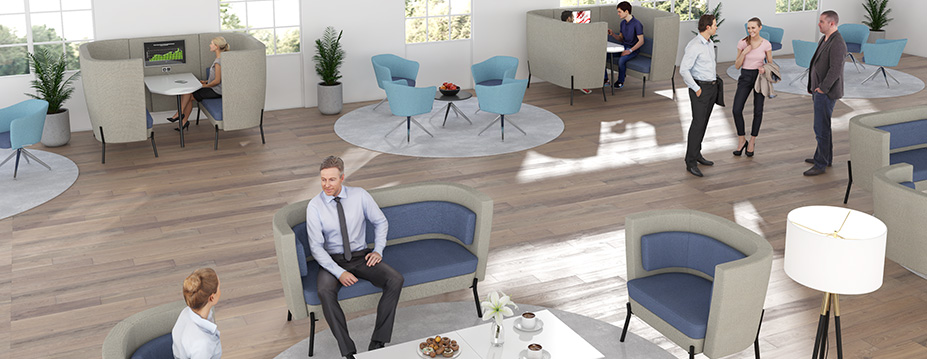In recent years there’s been a growing emphasis on supporting mental health and wellbeing in the workplace - and for good reason. With statistics indicating that one in six employees suffer from some form of mental health issue in the UK, prioritising staff wellbeing is becoming an essential part of working culture.

Workplace wellbeing is not a new concept but has gained momentum since the
pandemic. As people are returning to offices, it has become a prime
consideration for both employees and businesses. Studies show that the
physical working environment has an enormous impact on employees overall
health and wellbeing, but office designs do not always support the health
and wellbeing of employees.
Design ideas to create a healthy office
Poor design makes people miserable at work and increases absenteeism and
illness, reducing employee engagement, job satisfaction, and productivity.
These challenges are motivating companies to address wellbeing in the
workplace. Thoughtfully designed workplaces can promote movement, reduce
stress, and make it easier for employees to do their work. When employees
are well, their quality of life improves and so does their quality of work.
Of course, there are various ways to positively promote mental health in
working environments, such as improved benefit programmes, management
support structures and flexible working hours. But in this article, we’ll
be focusing on 5 physical aspects of workplace design that can contribute
to improved wellbeing:
1. Activity-based working
Lack of privacy and choices in an office can lead to anxiety and stress
among people. No one workspace can ideally support the variety of work that
people do throughout the day. A sense of pride and autonomy can be
established by offering employees a variety of workspaces in activity-based
working models. This will provide the occupants with options for different
areas specific to the user’s needs e.g. focus work, teamwork or meetings.
Worktables are a modern office trend based on a multi-purpose table system
that can be customised for a variety of uses and environments. Worktables
such as the Saxon or Crew range are ideal for activity-based learning,
offering companies one way to reconfigure their workspaces with a focus on
collaborative spaces while offering unassigned individual workstations.
2. Add some colour
The power of colour psychology and the effect it can have on a person’s
mood is no secret and has been effectively utilised in sectors like
advertising and marketing for years. With this in mind, these same
principles can and should be considered when it comes to designing working
environments that are looking to positively influence staff morale and
overall wellbeing.
Colours such as fabrics on seating, sofas and screens inside office spaces
can evoke a sense of calm and relaxation, but also foster creativity and
positive energy. A study has shown that employees working in spaces
enriched with colour, greenery, and artwork were 17% more productive. The
optimal combination of fabric colours will help improve productivity
without overstimulating the senses.
3. Acoustic control
Open offices are synonymous with noise and it is one of its biggest
criticisms. Noise has a negative effect on moods, productivity, and overall
mental health. As much as noisy offices are to be avoided, very quiet
spaces can also be a problem. Sound absorbing design elements such as the
Piano acoustics range, consisting of Piano Tiles wall panels, hanging
acoustic Piano Chords, and Piano Scales suspended acoustic panels provide
open plan offices and breakout spaces with multiple levels of acoustic
absorption which are not only colourful and modern additions to the office
aesthetics, but are also pertinent to the task at hand in each area.
4. Light and Air
In addition to colour, the presence or lack of natural light can have a
serious impact on a person’s mood and general health. Natural sunlight
alleviates levels of anxiety, symptoms of depression whereas indoor office
lighting often causes eye strain and can lead to headaches and stress.
Think about removing bulky furniture and heavy window dressings that could
be blocking out the light. In instances where natural light isn’t in
abundance, there are also options to upgrade artificial lighting to
illuminate the area effectively.
Good ventilation and superior air quality can have lots of health benefits.
It can boost people’s productivity at work and double their cognitive
function. The introduction of indoor plants will also have a calming and
de-stressing effect, as plants naturally purify the air by absorbing CO2
and releasing oxygen during photosynthesis, making them a valuable addition
for promoting a working environment that prioritises health and wellbeing.
5. Design for comfort
Ergonomic chairs can help with poor posture which can lead to back pain,
which can also contribute to increased rates of absenteeism. Installing
height adjustable desks can give employees the option to take breaks from
long periods of sitting which is bad for overall health. Other different
soft seating options throughout the office can make people feel at home and
provide somewhere for employees to relax throughout the working day.
Dams have the largest portfolio of office furniture products in the UK, all
featured in the new 2022 Furniture guide consisting of the complete
portfolio of furniture solutions for all your workplace needs. For
inspiration on how to design a modern workplace and furniture ideas for
improving wellbeing, have a read through today.
Modern workplace design
Creating office spaces with wellness in mind can benefit both companies and
their employees. So it makes sense for businesses to invest in office
design solutions that make office spaces healthier. It is not just ‘nice to
have’ but a ‘must have’ in the current scenario of work. A healthy,
supportive and comfortable workplace helps reach employees their true
potential.
The importance of wellbeing and mental health concerns in the workplace is
continuing to be a priority for businesses across all sectors. And when it
comes to workplace design, we hope you’ll find these insights helpful in
actioning a well-thought out space that’s primed for supporting every
employee.
